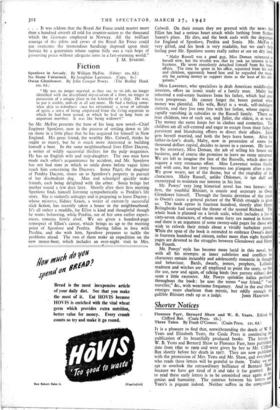Fiction
" He was no longer married, as they say, to nis job, no longer identified with the disciplined organisation of a liner, no longer in possession of a unique place in the hierarchy of a ship. He was, to put it starkly, nobody at all any more. He had a feeling some- what akin to nakedness a:nce his retirement a seise of solitude of spirit, a sense of being amputated from the living organism to which he had been joined, or which he had so long been an important member. It was like being widowed."
So Mr. McFee presents the hero of his long new novel—Chief Engineer Spenlove, now in the process of settling down to life on shore in a little place that he has acquired for himself in New England. His great friend, the wealthy Mrs. Colwell, thinks he ought to marry, but he is much more interested in building himself a boat. In the same neighbourhood lives Elliot Ducroy, a writer of wildly successful thrillers for the pulp- magazines. He has an English wife and step-daughter. The two men have made each other's acquaintance by accident, and Mr. Spenlove has not had time in which to settle down before vague hints reach him concerning the Ducroys. Sonia Paget, the daughter of Perdita Ducroy, strays on to Spenlove's property in pursuit of her disobedient dog. Man and schoolgirl quickly make friends, each being delighted with the other. Sonia brings her mother round a few days later. Shortly after their first meeting Spenlove finds himself listening sympathetically to Perdita's life story. She is violently unhappy and is preparing to leave Ducroy ; whose mistress, Sidney Saxon, a writer of extremely successful slick fiction, has recently taken a house in the neighbourhood. It's all rather a muddle, for Elliot is kind and thoughtful though he wants bolstering, while Perdita, out of her own earlier experi- ences, remains firmly aloof. We are given a hundred-page retrospect of Elliot's career, which brings us up to the meeting point of Spenlove and Perdita. Having fallen in love with Perdita, and she with him, Spenlove prepares to tackle the problems ahead. The two of them make an expedition on the new motor-boat, which includes an over-night visit to Mrs. Colwell. On their return they are greeted with the news that Elliot has had a serious heart attack while bathing from Sydney Saxon's place. He dies, and the book ends with the departure for England of Spenlove, Perdita and Sonia. Mr. McFee is very gifted, and his book is very readable, but we can't help feeling poor Mr. Spenlove seems really rather at sea on dry land.
" Malty Russell was a good guy, Miss Doman reiterated to herself now, but the trouble was that he nook no interest in his business. fie never completely detached himself from his home affairs. The time he spent in his office, separated from his wife and children? apparently bored him and he regarded the neces- sity for earning money to support them as the least of his obli- gations."
Miss Lawrence, who specialises in drab American middle-class interiors, offers an ironic study of a family man. Malty had inherited a real-estate businesi from his father, which had once been prosperous. He cannot forget the, boom period when money was plentiful. His wife, Beryl is a weak, self-indulgent slattern, and they live rent free with her father, whose capital is rapidly vanishing in subsidies to the Russell amily. There are four children, two of each sex, and Juliet, the eldest, is at work. The money she earns keeps her in clothes and cosmetics. The children are all self-centred and eager to escape from their father's persistent and blundering efforts to direct their affairs. Juliet gets herself married, and both the boys leave home. After his father-in-law's death, Malty, now in possession of some few thousand dollars capital, decides to invest in a caravan. He leaves to his secretary, Miss Doman, the job of selling his house and business, and of course she promises to leave no stone unturned. We are left to imagine the fate of the Russells, which does not require a very strenuous effort. Miss Lawrence writes freshly and with ease, but her irony becomes too p:angent after a time. We grow weary, not of the theme, but of the stupidity of the characters. Malty Russell, unlike Oblomov, is too dull and stereotyped to maintain our interest in his fate.
Mr. Powys' very long historical novel has two heroes: the first, the youthful Rhisiart, is cousin and secretary . to Owen Glendower himself. Through the fanatic devotion of the youth to Owen's cause a general picture of the Welsh struggle is given us. The book opens in fourteen hundred, shortly after Henn Bolingbroke had usurped the throne of the second Richard.
whole book is planned on a lavish scale, which includes a list of sixty-seven characters, of whom some forty are named in histor'. and there is an argument of some twenty-odd pages for those who wish to refresh their minds about a vividly turbulent period. While the span of the book is extended to embrace Owen's death in fourteen hundred and sixteen, rather more than eight hundred pages are devoted to the struggles between Glendower and Henry the Fourth.
Mr. Powys' style has become more lucid in this novel, but with all his attempts at inner subtleties and conflicts his characters remain incurably and adolescently romantic in thought and behaviour. Bards, dwarfs, jesters, prophets, Lollard madmen and witches are all employed to point the story, so that the use, now 'and again, of talking birds (not parrots either) does seem a little excessive. Mr. Powys sprinkles italics profusely throughout the book : he uses the terms "our friend," "015 traveller," &c., with wearisome frequency. And in the end Owe' emerges more charlatan than mystic, but oddly enough the


























 Previous page
Previous page